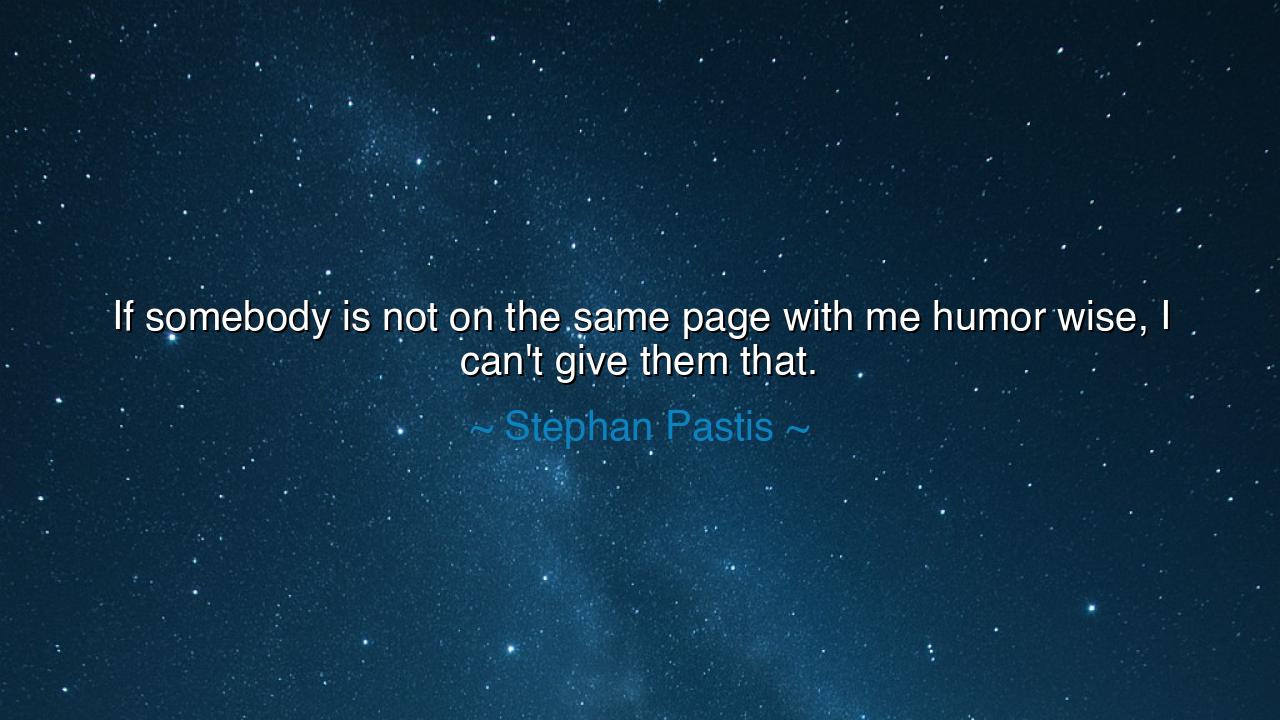
If somebody is not on the same page with me humor wise, I can't






Listen closely, O seekers of wisdom, to the words of Stephan Pastis, who speaks with clarity and depth on the power of humor: "If somebody is not on the same page with me humor wise, I can't give them that." These words echo the timeless understanding that humor is not simply a tool for entertainment, but a bridge between souls, an essential part of how we communicate, connect, and understand one another. To not share the same sense of humor is to be adrift in the same space but separated by a chasm of misunderstanding—a gap that no words alone can bridge.
In the ancient world, the great philosophers and orators understood that communication was not merely about the exchange of words, but about the deep connection between minds and hearts. Aristotle, in his teachings on rhetoric, spoke of the importance of ethos, the character of the speaker, in winning the audience’s trust. But equally important was the ability to connect with the audience’s emotions—to engage them in a shared experience. Humor, Aristotle understood, was one of the most powerful tools for this. When humor was in alignment with the audience’s values and worldview, it formed a bond that allowed deeper truths to be communicated. If, however, humor was not shared, the message would be lost. Stephan Pastis echoes this understanding, revealing that humor is not something that can be given freely to those who do not share the same mindset.
Consider the story of Socrates, the great philosopher, who often used humor to engage his students. His humor was sharp, ironic, and cutting, yet it was always aimed at challenging his students to think more deeply, to question their assumptions, and to see the world through a different lens. But Socrates also knew that humor, if not shared, could isolate and alienate. His humor worked only when his students were willing to meet him in that space, when they understood his intentions and were open to his challenges. Just as Pastis says, if the student was not "on the same page," the humor could not work its magic—it would fall flat, or worse, create a barrier. Humor, in this sense, is not just a tool for laughter, but a means of forging connection, of creating an understanding between souls.
The great king and philosopher Solomon also understood this delicate dance of communication. Solomon’s wisdom was not only in his judgments but in his ability to speak in a way that resonated with the hearts of his people. He understood that to reach someone, to connect with them, you must first meet them where they are. His famous proverbs, often laced with humor, were designed to be easily understood and relatable. When Solomon’s words and humor aligned with the people’s understanding of the world, his wisdom flourished. But if his humor or his wisdom had been misaligned with their understanding, it would have created division. In this, Solomon’s teaching is clear—humor is a bond, and when that bond is broken, communication falters.
Let us turn now to the world of the comedian—those who, like Stephan Pastis, wield humor not just for entertainment, but for communication and connection. Consider the life of Mark Twain, whose wit and humor have transcended generations. Twain’s humor was not universal, and he knew it. He often used humor to challenge societal norms, to critique the very foundations of politics and culture. But Twain was keenly aware that to reach his audience, to truly make them laugh, he had to meet them on common ground. Those who did not share his perspective on life, those who could not find humor in his sharp critiques, were left in the cold. Humor, Twain understood, is not just about making people laugh—it is about finding common ground in our shared experience. Without that alignment, humor becomes a wedge rather than a bridge.
In the world of today, Stephan Pastis's wisdom still rings true. The humor in our world is often fragmented, with individuals and communities finding themselves on different pages when it comes to what is funny, what is appropriate, and what resonates with the heart. In our personal relationships, in our workplaces, and in our public discourse, humor is a vital tool. It is how we connect, how we understand one another, and how we face the trials of life with lightness and strength. But Pastis warns us—if we are not on the same page, if our humor does not align, the effort to connect will falter. Humor must be shared to be truly effective; it is a form of communication that transcends words and connects the spirit.
So, O future generations, heed this lesson: humor is not a universal gift that can be given to all. It must be shared, understood, and embraced by both parties. When you seek to connect with others, whether through words, actions, or humor, remember that alignment is key. Seek to understand the perspectives of those around you, and meet them where they are. Use humor not to divide, but to unite, and recognize that when humor fails to align, it is not a flaw in the joke, but a misunderstanding in connection. Let humor be the bridge between you and others, and in doing so, you will create a world of shared understanding, compassion, and joy.






AAdministratorAdministrator
Welcome, honored guests. Please leave a comment, we will respond soon